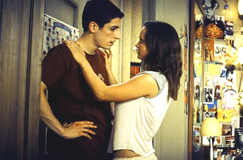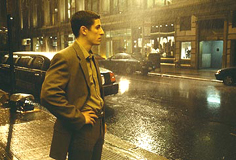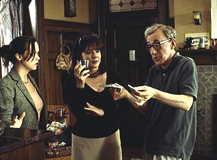Anything Else (Woody Allen, 2003)
 It seems that these days, the majority
of critics are willing to just lazily assume that Woody Allen is stuck in a rut,
but it will tough for them to hold that stance after viewing his latest film, Anything
Else. Due to the preponderance of long takes, which mark a radical, but
subtle stylistic shift from the director’s usual output, and subject matter
that contains a more subtle shift, the movie feels oddly at ease with itself.
Always one of the American cinema’s prime soul searchers, Allen has cast
himself here as Dobel, a comic sage just on this side of sanity. The advice that
he gives to his protégé Jerry Falk (Jason Biggs) comes mostly in the form of
anecdotes and jokes, with a tacked on, “Think about it.”
He blatantly states in the first scene that “There is great wisdom in
jokes,” and I think this might be a signifier to his audience that despite
attempts at Bergman-like introspection in more serious works like Interiors
and September, he’s gotten no closer to universal truths in those
films than in his comedies. I don’t see that as a failing of his dramas so
much as a testament to how insightful and touching Allen can be in his genre of
choice. By that logic, though, with Anything
Else on the surface a frivolous comedy, it should come as no surprise that
Allen seems to be smuggling themes of great import within.
It seems that these days, the majority
of critics are willing to just lazily assume that Woody Allen is stuck in a rut,
but it will tough for them to hold that stance after viewing his latest film, Anything
Else. Due to the preponderance of long takes, which mark a radical, but
subtle stylistic shift from the director’s usual output, and subject matter
that contains a more subtle shift, the movie feels oddly at ease with itself.
Always one of the American cinema’s prime soul searchers, Allen has cast
himself here as Dobel, a comic sage just on this side of sanity. The advice that
he gives to his protégé Jerry Falk (Jason Biggs) comes mostly in the form of
anecdotes and jokes, with a tacked on, “Think about it.”
He blatantly states in the first scene that “There is great wisdom in
jokes,” and I think this might be a signifier to his audience that despite
attempts at Bergman-like introspection in more serious works like Interiors
and September, he’s gotten no closer to universal truths in those
films than in his comedies. I don’t see that as a failing of his dramas so
much as a testament to how insightful and touching Allen can be in his genre of
choice. By that logic, though, with Anything
Else on the surface a frivolous comedy, it should come as no surprise that
Allen seems to be smuggling themes of great import within.
 Anything Else is easily one of the funniest movies of the year. Dobel’s
assault on a parked car being one of the year’s true highlights, because it
blends slapstick with a genuine sense of (post-9/11?) rage, and it shows how
behind its rapid fire verbal wit, Anything Else is a quiet disquisition
on separation anxiety. Dobel’s neuroses are wildly out of check, and as he
waits for the second Holocaust and prepares for the city to become a
battleground, he’s probably manifesting some of the doubts that Allen himself
has had about remaining in the city. Quite simply, the thought of stepping into
“anything else” becomes terrifying for its central character, Falk.
There’s something comfortable in the familiar, even if you’re familiar with
misery, the movie seems to be telling us. When a cabbie, the clichéd source of
simple yet true New York wisdom offers a dismissive, “It’s like anything
else,” to Dobel’s worries about death, it seems like a genuine breakthrough
in Allen’s cinema of the neurotic (and the ending of the film, which shows a
real severance of ties, is a bold step forward in his oeuvre).
Anything Else is easily one of the funniest movies of the year. Dobel’s
assault on a parked car being one of the year’s true highlights, because it
blends slapstick with a genuine sense of (post-9/11?) rage, and it shows how
behind its rapid fire verbal wit, Anything Else is a quiet disquisition
on separation anxiety. Dobel’s neuroses are wildly out of check, and as he
waits for the second Holocaust and prepares for the city to become a
battleground, he’s probably manifesting some of the doubts that Allen himself
has had about remaining in the city. Quite simply, the thought of stepping into
“anything else” becomes terrifying for its central character, Falk.
There’s something comfortable in the familiar, even if you’re familiar with
misery, the movie seems to be telling us. When a cabbie, the clichéd source of
simple yet true New York wisdom offers a dismissive, “It’s like anything
else,” to Dobel’s worries about death, it seems like a genuine breakthrough
in Allen’s cinema of the neurotic (and the ending of the film, which shows a
real severance of ties, is a bold step forward in his oeuvre).
 That’s not to suggest Anything
Else is not similar in tone to the rest of the director’s work. Focusing
primarily on a boy-meets-girl story, the relatively simple plot gives the
audience an amusing but insightful chance to observe some typically irrational
behavior. The early scenes of the film, in which Falk is convinced that Amanda
(Christina Ricci) is the girl for him, manage to capture a sense of swooning
romanticism that’s tempered by the fact that this new love requires two
breakups to get off the ground. In one especially funny scene, he either learns
that she has his favorite poet, singer, and environ, or at least convinces
himself that she does. Not long after he allows her to move in however, she
mentions that she has a “problem with commitment”, which puts it lightly.
Before long, the two of them have gone without sex for six months. Although
Allen paints the moody, disorganized, self-obsessed Amanda as something of a
monster, he certainly doesn’t discourage the audience from wondering why Falk
puts up with her. The repeated allusions to Tod Browning’s Freaks might be a bit snide, but they probably aren’t
coincidental. Biggs radiates a sweet charm, though, so he’s likable in spite
of his slightly pathological behavior, and that gives the movie enough heart to
avoid ever feeling cynical. Throughout, it’s Allen’s ability to endear us to
his characters in spite of their flaws that makes Anything Else’s never-ending ambivalence about the
temptation to run away from a bad situation and start afresh bearable.
That’s not to suggest Anything
Else is not similar in tone to the rest of the director’s work. Focusing
primarily on a boy-meets-girl story, the relatively simple plot gives the
audience an amusing but insightful chance to observe some typically irrational
behavior. The early scenes of the film, in which Falk is convinced that Amanda
(Christina Ricci) is the girl for him, manage to capture a sense of swooning
romanticism that’s tempered by the fact that this new love requires two
breakups to get off the ground. In one especially funny scene, he either learns
that she has his favorite poet, singer, and environ, or at least convinces
himself that she does. Not long after he allows her to move in however, she
mentions that she has a “problem with commitment”, which puts it lightly.
Before long, the two of them have gone without sex for six months. Although
Allen paints the moody, disorganized, self-obsessed Amanda as something of a
monster, he certainly doesn’t discourage the audience from wondering why Falk
puts up with her. The repeated allusions to Tod Browning’s Freaks might be a bit snide, but they probably aren’t
coincidental. Biggs radiates a sweet charm, though, so he’s likable in spite
of his slightly pathological behavior, and that gives the movie enough heart to
avoid ever feeling cynical. Throughout, it’s Allen’s ability to endear us to
his characters in spite of their flaws that makes Anything Else’s never-ending ambivalence about the
temptation to run away from a bad situation and start afresh bearable.
68
09-16-03
Jeremy Heilman